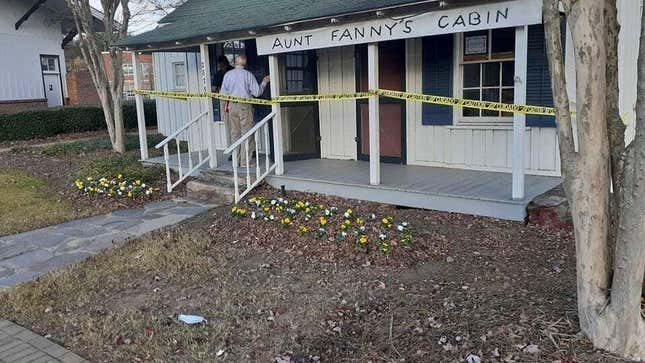
A Georgia city task force voted to demolish a World War II-era restaurant that’s theme honored the pre-Civil War South. For decades, Aunt Fanny’s Cabin attracted regular and famous diners in Smyrna, Georgia with its southern recipes and “family-like” atmosphere until it closed in 1992.
Apparently for those diners racist imagery and Black staff acting as caricatures was the perfect setting for Sunday brunch.
Last week, according to the Atlanta Journal-Constitution, a racially diverse task force made of city councilmen, a historian and community members voted to rid their community of a monument to a racist past.
The restaurant, which saw the likes of former U.S. president Jimmy Carter and several (white) American icons, according to the Associated Press, was named after Black civil rights activist Fanny Williams.
After the restaurant’s closing, the Journal-Constitution reports, most of the cabin’s original structure was torn down. Some pieces, including its front porch were bought by the city to create a replica for the welcome center. Over time, the site developed structural problems, AP reports, and it was determined that it would cost over $500,000 to repair.
Here’s more from AP:
The recommendation now goes to Smyrna’s City Council, which could make a final decision next month.
The now-defunct restaurant became a well-known dining destination starting in the mid-1900s. Its guests included sports icons Jack Dempsey and Ty Cobb and Hollywood star Doris Day. Former President Jimmy Carter stopped at the cabin during his campaigns.
But it also embraced an “Old South” decor and theme that was adopted by other restaurants, the AJC has previously reported.
According to news reports, Black youths hired as servers wore wooden menu boards around their necks and danced on table tops, and the walls had framed advertisements for slaves. Williams sat on the front porch in a faded dress and headwrap telling customers about her days as a slave, though she never was a slave, according to the AJC.
A statement posted last week on the City of Smyrna’s website blasted “the caricature and overt indignity of the theme of the establishment that was Aunt Fanny’s Cabin.”
“We wish to honor Fanny Williams and not the racist theme and myths of the former establishment and others like it, popular and profitable in post WWII Atlanta,” the statement said. “Though sometimes viewed in more glowing terms by an almost exclusively white patronage with fond memories of ‘great food’ and a ‘family atmosphere,’ these establishments are symbols and sentiments of a time that does not represent or honor the dignity of all, and certainly does not represent our community.”
The statement said Williams — a civil rights activist who helped raise money for a Black hospital — was exploited in the restaurant’s “social and marketing myths.”
“It really came down to do we want this to be a part of our community. And that, at the end of the day, was something that we all had to kind of wrestle with,” said Lewis Wheaton, a city councilman and co-chairman of the task force, according to the Journal-Constitution. “My hope and expectation is that we will shift to having better conversations about what to do with that property to pay tribute to Fanny Williams herself. And that’s where I think we are headed now.”
Jane Farmer, whose grandmother, Marjorie Bowman, was one of several owners of Aunt Fanny’s over the years, says she doesn’t remember the restaurant for any of its “racially offensive gimmicks” but rather as a happy place in her childhood. She told the Journal-Consitution that another owner after her grandmother must have implemented such changes.
“People were always so glad to see you ... It was such a beautiful thing and a great place to go. People loved it. But I’m so very sorry that it offended people, it should not do that. And if we could go back in time, we’d change it,” she said, according to the Journal-Constitution.
The task force said that unless a group comes to remove the cabin from city property, it will be torn down, leaving only the fireplace and chimney to be preserved in honor of Fanny Williams.

